Feature
Nutrition for Growth
Multisectoral Efforts (Health / Food and Agriculture)
From Children to Adults: Ensuring Health at All Ages
JICA is cooperating with Ghanaian health and agricultural institutions to improve nutrition at all stages of life. Specifically, nutrition counseling to improve conditions in the health sector, and promoting a technique to produce rice with high nutritional value in the agricultural sector.

Republic of Ghana
In 1999, Ghana introduced the Community-based Health Planning and Services (CHPS), a national strategy to deliver essential community-based health services involving planning and service delivery within the communities. The implementation of CHPS is based on mobilizing outreach activity. For instance, community health workers visit communities and households to provide necessary health care, and raise health awareness in the whole community, especially among pregnant women, mothers, and children. JICA provides support to CHPS in implementing this strategy at various levels.
Health and Nutrition Advice via Maternal and Child Health Handbooks
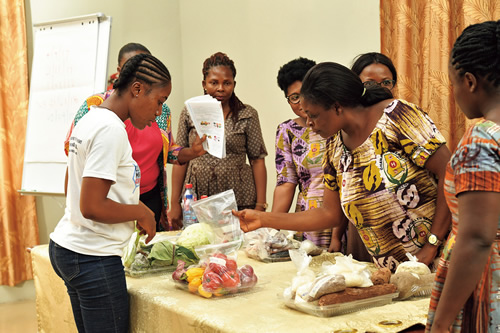
A training class in session. Trainees learn about nutrition by classifying foods into the four groups recommended for daily consumption.
The maternal and child health handbook (also known as the MCH handbook) is a tool promoted by JICA. It originated in Japan and is now being used to protect the health of mothers and children worldwide. Ghana began to prepare maternal and child health handbooks with JICA's support in 2016, and the completed handbooks have been distributed nationwide since 2018. JICA is cooperating with the Ministry of Health to train health workers from all over the country for the effective use of the handbooks. By November 2019, over 1,500 health workers had received training and completed the training course.
The health workers are trained how to evaluate a child's growth and nutritional status using the handbooks' growth monitoring chart, how to ask a mother about feeding and hygiene, and how to use this information to provide advice tailored to the child's individual status. During training, participants also learn the importance of promoting improved diets based on available local foods in a given season. In addition, they learn a method of nutrition counseling that takes into account the physical condition and symptoms, such as weight gain and anemia, during pregnancy.
The maternal and child health handbooks give advice about diets, and include illustrations of the food groups indicating balanced consumption for pregnant women, mothers, and children. To ensure incorporation of this information into daily diets, these healthcare workers are formed into groups and tasked with developing complementary foods for children of varying age groups.
The Government of Ghana prioritizes and works on the improvement of nutrition status during the first 1,000 days (the period from gestation until the age of two) since it has a significant impact on the entire life of a child.
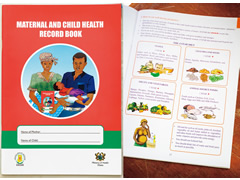
MCH handbooks have been distributed in Ghana since 2018.
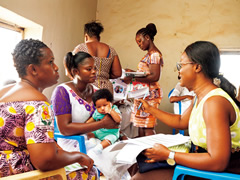
Practical training in nutrition counseling. Trainees learn the importance of listening to mothers and pregnant women with attentiveness and compassion.
Grace Billy Campitip
Regional Instructor and Kwadaso Board of Health Director
I taught the health workers the knowledge and skills they need to be able to give advice considering each child's growth and home environment. It would give me great pleasure for Ghana to develop more by making the people healthier through my work in improving nutrition.
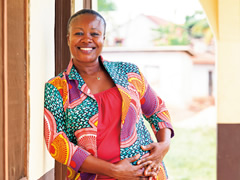
Improving Nutrition and Promoting Health Over a Lifespan
With the support of JICA experts, CHPS has been implemented faster in the Upper West Region than in other regions. Since 2017, the region has seen the implementation of health services based on a person's life span [1] , which not only addresses maternal and child health, but also aims to prevent disease and promote health in every stage of life.
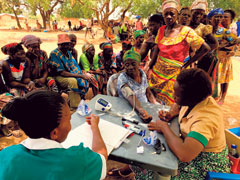
Measuring adults' blood pressure in a village square. Ghana does not yet have health checkups for adults.
While child malnutrition remains a concern, similar to most developed countries, socioeconomic changes have led to increased obesity, hypertension, and diabetes. To combat these health problems, community-based comprehensive health services are planned and provided. These include provision of early diagnosis, promotion of health through improving nutrition and exercise, and prevention of disease.
More Nutritious Rice Makes Farmers Healthier
In the north of Ghana, rice was traditionally parboiled to reduce grain breakage, but the process has also gained attention for its capacity to reduce nutrient loss during milling. Trials are being conducted to see if this rice can be sold with higher added value.
"Upon analysis, we found that parboiling produced a nearly three-fold increase in the vitamin B content of milled rice. Localities where maize is a staple food are prone to Vitamin B deficiency. We expect that better nutrition outcomes will be achieved by promoting parboiled rice consumption in these areas," said Baba Abdulai, an agricultural officer who promotes its consumption and provides technical guidance.
The pursuit of better nutrition includes multisectoral projects, many people, and working in a wide range of fields. However, all involved are united in their efforts to realize the day when the people of Ghana pay attention to nutrition and eat appropriate food to grow in health, as did the Japanese when they gained healthy eating habits in the postwar period. If a population can live in good health throughout their lives, their country can also achieve sustainable development.

Rough rice (front) and milled parboiled rice.
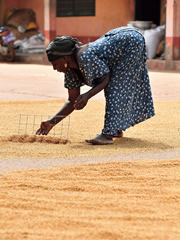
Parboiling is a method of processing rice in which rough rice is soaked in hot or cold water, steamed, dried (shown in photo), and then milled.
Note
- A theoretical approach that attempts to explain diseases in adults by the various factors that influenced them over the course of their lives, including during gestation and infancy.




scroll